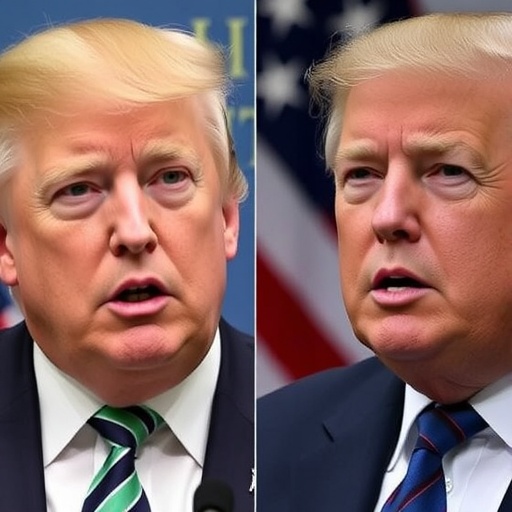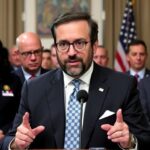Jack Smith Requests Open Congressional Hearings on Trump Investigations
In a dramatic escalation of post-presidency accountability efforts, former special counsel Jack Smith has formally requested to testify in open hearings before the House Judiciary and Senate Judiciary Committees. This move, announced on Wednesday, signals Smith’s determination to lay bare the intricacies of his high-profile Trump investigations, potentially reshaping public and political discourse around former President Donald Trump’s legal entanglements.
Smith, who led the Justice Department’s probes into Trump’s handling of classified documents and efforts to overturn the 2020 election results, stepped down from his role following the change in administration. His request comes at a time when Trump, now facing multiple indictments, continues to dominate Republican politics and eyes a potential 2024 comeback. By seeking transparency through Congress, Smith aims to counter narratives of political persecution that have swirled around the Trump investigations since their inception.
The hearings, if approved, would mark a rare public airing of details from one of the most contentious special counsel inquiries in modern U.S. history. Sources familiar with the matter indicate that Smith’s testimony could include declassified evidence, timelines of key events, and insights into the decision-making processes that drove the cases forward.
Smith’s Tenure: From Classified Documents to January 6 Chaos
Jack Smith‘s journey as special counsel began in November 2022, when Attorney General Merrick Garland appointed him to oversee the Trump investigations. Tasked with impartiality in a polarized environment, Smith assembled a team of seasoned prosecutors to dissect two major threads: the alleged mishandling of classified materials at Mar-a-Lago and the broader election interference schemes culminating in the January 6, 2021, Capitol riot.
The classified documents case quickly became a flashpoint. Federal agents raided Trump’s Florida estate in August 2022, recovering over 100 documents marked as classified, including materials on nuclear programs and defense capabilities. Smith’s investigation revealed what prosecutors described as willful retention and obstruction, leading to a 37-count indictment against Trump in June 2023. Court filings detailed how Trump allegedly showed sensitive photos to unauthorized individuals and resisted returning the documents despite repeated DOJ requests.
Parallel to this, the January 6 probe expanded into a sweeping examination of Trump’s role in attempting to subvert the election. Smith’s team uncovered evidence of fake electors schemes, pressure on state officials, and inflammatory rhetoric that fueled the Capitol breach. Indictments charged Trump with conspiracy to defraud the United States, obstruction of an official proceeding, and conspiracy against rights—charges that painted a picture of a coordinated effort to undermine democracy.
Throughout his tenure, Smith emphasized the gravity of these matters. In a rare public statement upon his appointment, he vowed to ‘follow the facts wherever they lead,’ a phrase that resonated amid accusations of bias from Trump supporters. Statistics from the investigations underscore their scale: over 1,000 witnesses interviewed, thousands of documents reviewed, and forensic analysis of digital communications that traced Trump’s inner circle’s actions.
Yet, Smith’s work was not without controversy. Trump labeled the probes a ‘witch hunt,’ and his legal team filed motions to dismiss based on presidential immunity—a battle now headed to the Supreme Court. As the investigations progressed, they intersected with broader political currents, including the House’s own impeachments and congressional probes into January 6.
Why Open Hearings Now? Smith’s Push for Transparency
Smith’s request for open hearings before the House Judiciary and Senate Judiciary Committees is timed strategically, insiders say, to coincide with a pivotal moment in American politics. With Trump leading Republican polls for the 2024 nomination, the former special counsel appears intent on ensuring that the public record remains unclouded by partisan spin.
In a letter obtained by this outlet, Smith wrote to the committee chairs: ‘The American people deserve a full accounting of the evidence and processes that defined these investigations. Open testimony will illuminate the rule of law’s application, free from the distortions that have clouded public understanding.’ This plea underscores Smith’s frustration with sealed court filings and limited public disclosures, which he argues have allowed misinformation to proliferate.
Legal experts view this as a bold gambit. ‘By inviting Congress into the fray, Smith is leveraging legislative oversight to bolster the legitimacy of his work,’ said Barbara McQuade, a former U.S. attorney and MSNBC legal analyst. She noted that similar requests have historically amplified special counsel findings, citing the Watergate-era hearings that exposed Nixon’s abuses.
The request specifies open sessions, eschewing closed-door briefings to maximize visibility. Smith proposes covering topics like the scope of subpoenas issued during the Trump investigations, interactions with Trump’s defense teams, and the ethical considerations of prosecuting a former president. He also hints at addressing recent Supreme Court arguments on immunity, which could derail parts of the cases.
Politically, this move challenges Congress to confront the Trump investigations head-on. The House Judiciary Committee, chaired by Republicans, has been a hotbed for defenses of Trump, while the Senate Judiciary panel, under Democratic leadership, has pushed for accountability. Smith’s testimony could force bipartisan reckoning, especially as midterm echoes linger and 2024 looms.
Congressional Reactions: Partisan Divide Deepens
The announcement has ignited a firestorm on Capitol Hill, with reactions splitting along familiar partisan lines. House Judiciary Committee Chair Jim Jordan (R-Ohio) issued a statement calling Smith’s request ‘a desperate attempt to revive a dead investigation,’ vowing to scrutinize any testimony for ‘anti-Trump bias.’
Jordan, a staunch Trump ally, referenced the committee’s own probes into the FBI’s Mar-a-Lago search, which he deemed ‘overreach.’ His panel has subpoenaed Smith in the past, demanding records on the investigations—a tit-for-tat that highlights the contentious relationship between Congress and the DOJ under Smith’s watch.
On the Senate side, Judiciary Chair Dick Durbin (D-Ill.) expressed openness, stating, ‘Transparency is the cornerstone of our democracy. If Mr. Smith has facts to share on the Trump investigations, the American public should hear them.’ Durbin suggested scheduling hearings post-Supreme Court rulings, potentially in the fall, to avoid prejudicing ongoing cases.
Republican senators were more circumspect. Lindsey Graham (R-S.C.), a committee member, warned that open hearings could ‘politicize justice further,’ echoing Trump’s claims of a ‘deep state’ conspiracy. Meanwhile, Democrats like Adam Schiff, formerly of the House Intelligence Committee, praised the move: ‘Jack Smith’s work exposed real threats to our elections. Congress must amplify that voice.’
Public opinion polls reflect the divide. A recent Quinnipiac survey found 52% of Americans support congressional oversight of the Trump investigations, but only 28% of Republicans agree, compared to 78% of Democrats. This polarization could complicate scheduling, as committee majorities dictate agendas.
Advocacy groups are mobilizing too. The Brennan Center for Justice urged swift action, arguing that hearings would ‘safeguard democratic norms.’ Conversely, the Heritage Foundation labeled it ‘election interference,’ urging delays until after 2024.
Legal Ramifications: How Hearings Could Reshape Trump’s Defenses
Beyond politics, Smith’s congressional appearance carries profound legal weight for the Trump investigations. With trials delayed— the documents case stalled in Florida federal court and the election case mired in D.C. appeals—testimony could influence judges, juries, and public perception.
Prosecutors worry about prejudicing juries, but Smith has assured committees that his remarks will adhere to judicial gag orders. Still, details on evidence like audio recordings of Trump discussing classified info or texts from aides plotting election challenges could sway opinions.
Trump’s legal team, led by attorneys like Todd Blanche, has already moved to leverage congressional dynamics. They’ve argued in filings that political motivations taint the probes, citing Smith’s alleged ties to prior Obama-era cases. Hearings might provide fodder for these claims or, conversely, reinforce the DOJ’s independence.
Broader implications extend to future special counsel roles. If hearings proceed, they could set precedents for how ex-officials engage with Congress, potentially deterring whistleblowers or encouraging more public accountability. Statistics from past inquiries, like Mueller’s 2019 testimony, show such events boosting media coverage by 300% and shifting public support metrics.
International observers are watching closely too. Allies like the UK and EU have expressed concerns over U.S. election integrity, and Smith’s disclosures could reassure global partners that the Trump investigations uphold rule-of-law standards.
As the dust settles from indictments—Trump faces 91 felony counts across four cases— these hearings represent a crossroads. They might accelerate dismissals if biases are unearthed or solidify convictions by humanizing the evidence.
Looking Ahead: Timeline and Stakes for Democracy
With Smith’s request now in committee hands, the path forward hinges on bipartisan willingness. House leaders aim for preliminary scheduling by late summer, while Senate counterparts eye autumn sessions to align with Supreme Court decisions expected in June or July.
If approved, expect multi-day hearings with live broadcasts, expert witnesses, and follow-up subpoenas. Smith has indicated willingness to submit written statements in advance, allowing lawmakers to prepare pointed questions on everything from FISA warrants to witness protections in the Trump investigations.
The stakes extend far beyond one man. As America grapples with eroding trust in institutions— a 2023 Gallup poll shows only 26% confidence in the DOJ— these proceedings could either heal divides or exacerbate them. For Trump, they pose risks to his narrative of victimhood, potentially galvanizing supporters or alienating moderates.
Ultimately, Jack Smith’s outreach to Congress underscores a commitment to transparency in turbulent times. Whether it leads to catharsis or chaos, the hearings promise to be a defining chapter in the saga of accountability, reminding us that in democracy, sunlight remains the best disinfectant.








